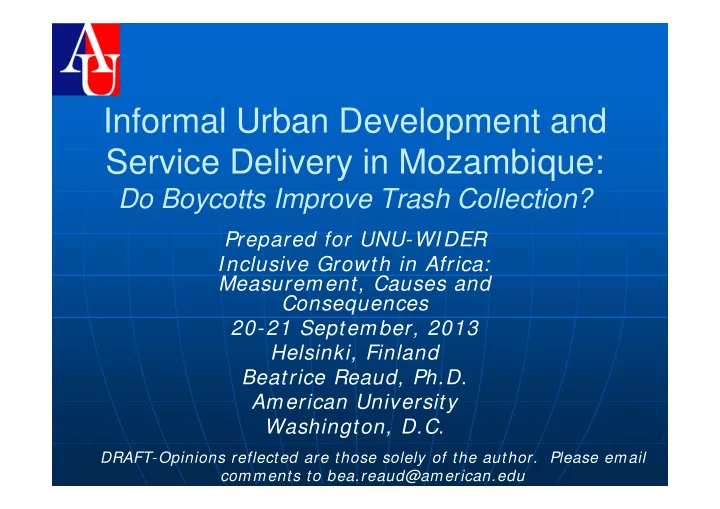

Informal Urban Development and Service Delivery in Mozambique: Do Boycotts Improve Trash Collection? Prepared for UNU-WIDER Inclusive Growth in Africa: Measurement, Causes and Consequences 20-21 September, 2013 Helsinki, Finland Beatrice Reaud, Ph.D. American University Washington, D.C. DRAFT-Opinions reflected are those solely of the author. Please email comments to bea.reaud@american.edu
What factors affect municipal performance in a new democracy? Timeless and Timely • The individual township was the place where local interests, passions, duties and rights clung together and fostered at its heart real political activity which was active, thoroughly democratic, and republican. Alexis De Tocqueville Democracy in America Challenge presumptions that democracies are successful if they: • Have repeated elections/ turnover/ sanction (Diamond/ Dahl) • Raise income levels (Przeworski) Democracies are successful if they deliver desired services ( Putnam/ DeSoto)
What is the extent to which civic participation motivates municipalities to improve service delivery?
Context: Mozambique New democracy (1994)/ decentralization (1998) Posts: • Colonial (1975) • Conflict (Renamo/ Frelimo) • Socialist Low-income Constraints make findings more robust
Method Embedded Single Case Design 4 mini-cases (Maputo, Beira, Dondo, and Matola) Services: Trash Collection and Market Management 2 service experiments, 11 focus groups, 14 markets, 120 semi-structured interviews, national and municipal budget and planning documents, elite interviews.
Definition of Civil Society and Results • Civil society as participation and voice. • Ability for citizens to voice concern over and effect municipal policy. • Strength: 1. access and control over resources 2. influence over municipal policy • Strong= 2 • Active= 1 • Weak= 0
Did the Job Get Done? Trash Collection Monitoring 4 cities • 2 neighborhoods each • formal/ informal (sites of focus groups) • 6-8 observation sites Monitor patterns of trash collection consistent with period of service • Maputo: 7 days/ 24 hours • Matola: weekly • Dondo: 5 days/ twice a week • Beira: 7 days/ weekly
Beira-Inhamodima credit: Adapted from Harry Hatry, Performance Measurement: Getting Results (2007, Urban Institute Press)
Beira-Munhava Central credit: Adapted from Harry Hatry, Performance Measurement: Getting Results (2007, Urban Institute Press)
What is the extent to which civic participation motivated municipalities to improve service delivery? Strong: ( 2 ) • Maputo 2002 citizen protest (Mayor, GTZ-AGRESU) ADASBU (MSF), Associação Kithunga Active ( 1 ) • Beira: Mayor’s platform Munhava (Africa 70, Italian Cooperation, others) • Dondo: Mayor/ Participatory Budgeting (Austrian Development Cooperation) W eak ( 0 ) • Matola: Selective service provision, no associations
Conclusions • Path to financial self-sufficiency (Maputo). • Donor assistance (Maputo and Dondo) . • Technocratic Leadership: I have seen a change since 5 years, Inkosa yinkisa specifically in the mandate of this ngabantu. (mayor). Maputo, 2008. • (A leader is only • In 1998, we died like ants. Due to the Mayor, a leader because now we see streets paved and things are of his people). starting to look normal. Although we may not Chi-Shona have trash collection where I am, it is clear saying that this mayor is working and that things have gotten better. Beira, 2009.
Many thanks for your attention. Beatrice Reaud, Ph.D. American University Washington, D.C. http: / / www.american.edu/ spa/ fa culty/ br1319a.cfm bea.reaud@american.edu
Recommend
More recommend